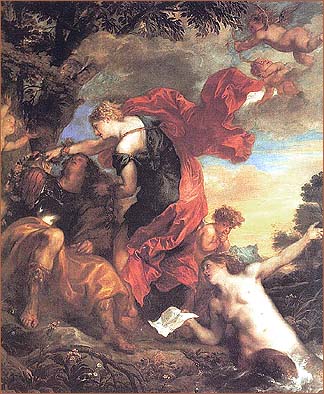 |
THE APPARITION OF HIS MISTRESS
CALLING HIM TO ELYSIUM.
by Robert Herrick
Desunt nonnulla—
COME then, and like two doves with silv'ry wings,
Let our souls fly to th' shades where ever springs
Sit smiling in the meads ; where balm and oil,
Roses and cassia crown the untill'd soil.
Where no disease reigns, or infection comes
To blast the air, but ambergris and gums.
This, that, and ev'ry thicket doth transpire
More sweet than storax from the hallowed fire,
Where ev'ry tree a wealthy issue bears
Of fragrant apples, blushing plums, or pears ;
And all the shrubs, with sparkling spangles, shew
Like morning sunshine tinselling the dew.
Here in green meadows sits eternal May,
Purfling the margents, while perpetual day
So double gilds the air, as that no night
Can ever rust th' enamel of the light.
Here, naked younglings, handsome striplings, run
Their goals for virgins' kisses ; which when done,
Then unto dancing forth the learned round
Commixed they meet, with endless roses crown'd.
And here we'll sit on primrose-banks, and see
Love's chorus led by Cupid ; and we'll be
Two loving followers, too, unto the grove
Where poets sing the stories of our love.
There thou shalt hear divine Musæus sing
Of Hero and Leander ; then I'll bring
Thee to the stand, where honour'd Homer reads
His Odysseys and his high Iliads ;
About whose throne the crowd of poets throng
To hear the incantation of his tongue :
To Linus, then to Pindar ; and that done,
I'll bring thee, Herrick, to Anacreon,
Quaffing his full-crown'd bowls of burning wine,
And in his raptures speaking lines of thine,
Like to his subject ; and as his frantic
Looks shew him truly Bacchanalian-like
Besmear'd with grapes, welcome he shall thee thither,
Where both may rage, both drink and dance together.
Then stately Virgil, witty Ovid, by
Whom fair Corinna sits, and doth comply
With ivory wrists his laureat head, and steeps
His eye in dew of kisses while he sleeps ;
Then soft Catullus, sharp-fang'd Martial,
And towering Lucan, Horace, Juvenal,
And snaky Persius, these, and those, whom rage
(Dropt for the jars of heaven) fill'd t' engage
All times unto their frenzies ; thou shalt there
Behold them in a spacious theatre.
Among which glories, crowned with sacred bays
And flatt'ring ivy, two recite their plays—
Beaumont and Fletcher, swans to whom all ears
Listen, while they, like syrens in their spheres,
Sing their Evadne ; and still more for thee
There yet remains to know than thou can'st see
By glim'ring of a fancy. Do but come,
And there I'll shew thee that capacious room
In which thy father Jonson now is plac'd,
As in a globe of radiant fire, and grac'd
To be in that orb crown'd, that doth include
Those prophets of the former magnitude,
And he one chief ; but hark, I hear the cock
(The bellman of the night) proclaim the clock
Of late struck one, and now I see the prime
Of day break from the pregnant east : 'tis time
I vanish ; more I had to say,
But night determines here, away.
| |

Van Dyck. Rinaldo and Armida. 1625.
From CGFA |
Transpire, breathe.
Purfling, trimming, embroidering.
Margents, bowers.
Round, rustic dance.
Rage, the poetic "furor".
Comply, encircle.
Their Evadne, the sister of Melantius in their play
"The Maid's Tragedy".
|
Source:
Herrick, Robert. Works of Robert Herrick. vol II.
Alfred Pollard, ed.
London, Lawrence & Bullen, 1891. 2-5.
 | to Works of Robert Herrick |
Site copyright ©1996-2001 Anniina Jokinen. All Rights Reserved.
Created by Anniina Jokinen on July 12, 1999. Last updated on February 8, 2001.
|


